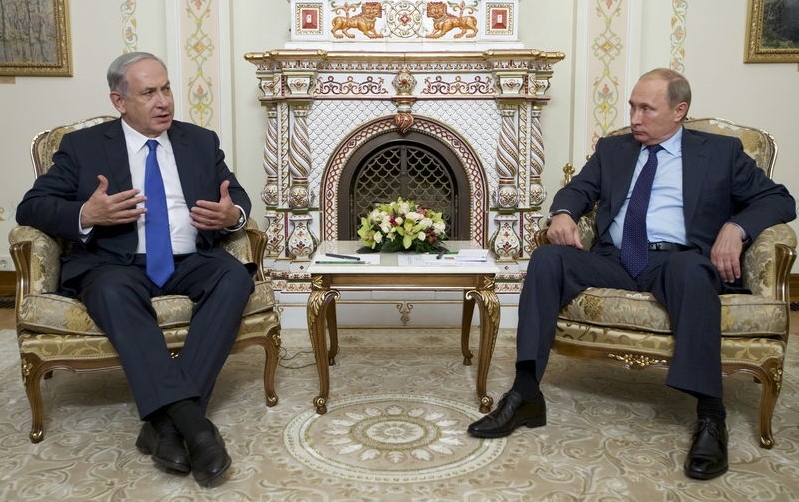
NOVO-OGARYOVO, Russia (Reuters) - Israel and Russia agreed on Monday to coordinate military actions over Syria in order to avoid accidentally trading fire, Prime Minister Benjamin Netanyahu said during a visit to Moscow.
Recent Russian reinforcements for Syrian President Bashar al-Assad, which regional sources say include warplanes and anti-aircraft systems, worry Israel, whose jets have on occasion bombed the neighboring Arab country to foil suspected handovers of advanced arms to Assad's Lebanese guerrilla ally Hezbollah.
Briefing Israeli reporters after he met Russian President Vladimir Putin, Netanyahu said he had come with the goal of "prevent(ing) misunderstandings between IDF (Israel Defense Force) units and Russian forces" in Syria, where Assad is fighting Islamist-dominated insurgents in a civil war.
Netanyahu added that he and Putin "agreed on a mechanism to prevent such misunderstandings". He did not elaborate. There was no immediate comment from the Kremlin.
In earlier remarks as he welcomed Netanyahu to the presidential residence of Novo-Ogaryovo, outside Moscow, Putin said Russian actions in the Middle East would always be "responsible".
Underlining the importance of Netanyahu's one-day visit to Moscow, Israel's premier took along the chief of its armed forces and the general in charge of Israeli military intelligence.
Putin, who shares Western concern about the spread of Islamic State influence, has pledged to continue military support for Assad, assistance that Russia says is in line with international law. Russia has been focusing forces on Syria's coast, where Moscow keeps a big Mediterranean naval base.
The United States, which along with its allies has been flying missions against Islamic State insurgents in Syria, has also been holding so-called "deconfliction" talks with Russia.
KEEPING U.S. INFORMED
Netanyahu told Israeli reporters that he had informed the Americans "on each and every detail" of his Moscow visit, adding: "Everyone has an interest in avoiding an unnecessary clash" over Syria.
A U.S. official told Reuters that U.S.-Israeli coordination allowed the allies to share classified technologies for identifying Russian aircraft over Syria: "We know how to spot them clearly and quickly," the official said.
Separately, U.S. officials said Russia had started flying surveillance missions with drone aircraft in Syria in what appeared to be Moscow's first air operations there since beginning its build-up. The officials, speaking on condition of anonymity, could not say how many aircraft were involved.
A former Netanyahu adviser said Israel was concerned that Russia's help for Assad in battling an insurgency now in its fifth year could create a de facto axis between Moscow, Iran and Hezbollah.
Iran, Israel's arch-foe, is Assad's other foreign backer and patron of Hezbollah, which fought Israel to a standstill in the 2006 Lebanon war. Israel worries that top-of-the-line Russian military hardware being deployed in Syria could end up in Hezbollah's arsenal.
"Our policy is to do everything to stop weapons from being sent to Hezbollah," Netanyahu told Putin at their photo-op. He also set out Israel's policy of striking at guerrillas suspected of preparing to attack it from the Syrian Golan, on the northern frontier - an apparent signal to Russia to steer clear there.
The former Netanyahu adviser, who spoke to Reuters on condition of anonymity given the sensitivity of the issue, said any understandings reached with Putin "could come down to Israel and Russia agreeing to limit themselves to defined areas of operation in Syria, or even that they fly at daytime and we fly at night".
(Additional reporting by Vladimir Soldatkin; Writing by Dan Williams; Editing by Mark Heinrich)







